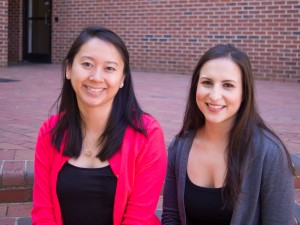Two UNC Gillings students selected as Innovation Next award finalists
March 30, 2016
Two students from UNC’s Gillings School of Global Public Health are among the finalists for the 2016 “Innovation Next” project, an award that includes $80,000 in development funds and the opportunity to work the renowned global design company IDEO to refine and execute their proposal.
Created by a grant by the U.S. Health and Human Services Office of Adolescent Health, Innovation Next is designed to find creative, interactive technology interventions for preventing teen pregnancy. Ten teams out of 127 entries were chosen as finalists in this year’s competition.
The UNC Gillings team, which submitted a project called “My Sex Ed,” is led by Department of Health Behavior doctoral student Elizabeth Chen, MPH, who is also the founder of MyHealthEd.org. She is joined by Cristina Leos, MSPH, who is in health behavior’s MSPH to PhD program and currently in the second year of her PhD studies, as well as a Gillings Merit Scholar and Gates Foundation Scholar. Vichi Jagannathan, an MBA candidate from the Yale School of Management is also a member of their team.
“This experience means that we have the opportunity to level the playing field by proposing a technological solution for high quality sex education for middle school students who otherwise may not have access,” Chen says. “This also means that we have a unique opportunity to innovate alongside youth in Eastern North Carolina and Western Texas. I hope that this training will shape my future research and lead to the development of more effective and sustainable solutions for improved sexual health outcomes for adolescents.”
The team’s “My Sex Ed” proposal is focused on creating a phone-based app designed for adolescents. The app would provide a tailored sex education program for each user, which the team hopes will produce a higher potential for engagement and effectiveness than current sex education curricula.
“One of my goals for graduate training at Carolina has been to integrate innovative techniques from diverse fields to better understand adolescent sexual health,” says Leos. “This award will allow us to move beyond traditional channels of research to develop an engaging, tech-centered solution to increase access to sex education for middle school students in different parts of the country. I am excited to apply design thinking and work with youth to create an innovative solution to improve adolescent sexual health.”

According to the award site the finalist teams will participate in three workshops over the next five months learning about design thinking from IDEO. The teams will also go into the field to research their target audiences and work on prototypes of their innovations. At the end of the process in August, five winning teams will receive $325,000 to further develop their idea into a testable resource.
“Uncovering innovative approaches to difficult problems like unplanned pregnancy isn’t easy,” says Evelyn M. Kappeler, director of the Health and Human Services Office of Adolescent Health. “By investing in technology as a part of the solution, we hope information for young people stays current, compelling, and effective.”
Gillings School of Global Public Health contact: David Pesci, director of communications, (919) 962-2600 or dpesci@unc.edu

